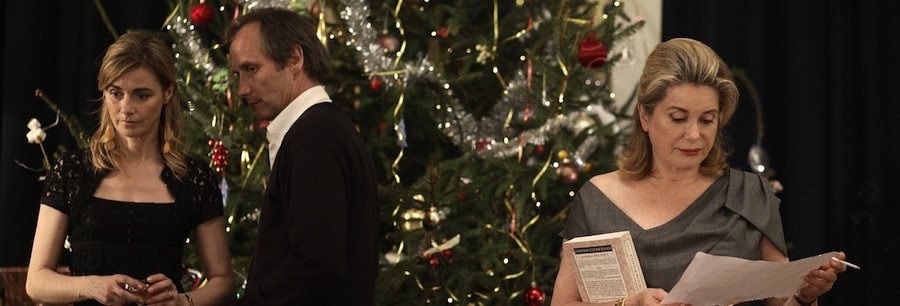A Christmas Tale
Christmastime is full of rituals. There are those that are more common, let’s say, decorating a Christmas tree and drinking way too much mulled wine in a dazzling market, and then there are those that are a bit more individual and private. For instance, on the night before Christmas Eve a friend of mine takes a stroll all over town and visits all the people she owes money to. She doesn’t like owing money, she thinks it brings bad luck.
I’m a tad lazier and instead of copious amounts of walking, I look for alternative Christmas films to watch. Don’t get me wrong, I absolutely love Love Actually, but after seeing it about 20 times, I desperately want something new. I know that deep inside your head you’re moaning “not another article about Christmas”, but I promise you, the film I found is worth it.
There is something innately fascinating about French cinema. I think we are all, consciously or unconsciously, jealous of its elegance, style and freedom to portray the depths of almost anything immensely gracefully. Therefore, I was immediately interested in Armand Desplechin, numerous nominee and winner of the Palme d’Or at the Cannes film festival. Desplechin seems fascinated with Catherine Deneuve, casting her in every second film he’s created, and the shifts in relationships between people, where they’re lovers, family or passers-by on the long road towards the end of life. A Christmas Tale (Un conte de Noël), his 2008 oeuvre, sees the director excel at what he knows best – an analysis of a family reunion.
 The plot is relatively simple: members of the Vuillard family gather at the home of Junon (Catherine Deneuve) and Abel (Jean-Paul Roussillon), only to learn that the iron-willed matriarch is suffering from leukaemia and might not survive. To add tension, Henri (Mathieu Amalric), the slightly alcoholic enfant terrible of the family decides to join the celebration for the first time in years. This upsets Elizabeth (Anne Consigny), as there has been a huge conflict between them ever since they were children. Moreover, her son, Paul (Emile Berling) who has recently suffered a mental breakdown, is haunted by black dogs that suddenly appear in mirrors. The only stable unit seems to be Ivan (Melvil Poupaud) and Sylvia (Chiara Mastroianni), yet this harmony is also shattered by the knowledge of Ivan’s cousin’s (Laurent Capelluto) long-lasting love for her. Wine is drunk, food is eaten, tears are shed, revelations are shared and hearts are broken.
The plot is relatively simple: members of the Vuillard family gather at the home of Junon (Catherine Deneuve) and Abel (Jean-Paul Roussillon), only to learn that the iron-willed matriarch is suffering from leukaemia and might not survive. To add tension, Henri (Mathieu Amalric), the slightly alcoholic enfant terrible of the family decides to join the celebration for the first time in years. This upsets Elizabeth (Anne Consigny), as there has been a huge conflict between them ever since they were children. Moreover, her son, Paul (Emile Berling) who has recently suffered a mental breakdown, is haunted by black dogs that suddenly appear in mirrors. The only stable unit seems to be Ivan (Melvil Poupaud) and Sylvia (Chiara Mastroianni), yet this harmony is also shattered by the knowledge of Ivan’s cousin’s (Laurent Capelluto) long-lasting love for her. Wine is drunk, food is eaten, tears are shed, revelations are shared and hearts are broken.
The film is ironic yet does not turn sour. Sweet but not sugarcoated. The character relations and bonding are extremely enjoyable to watch; their mini-dramas are portrayed in the context of the ticking bomb, the leukaemia. Yet the film is undeniably funny. Henri is reminiscent of Bernard from Black Books, excessively drinking and teaching Paul the true ways of life, whereas the chemistry between Deneuve and Roussillon is golden. One might say that A Christmas Tale is a heartfelt black comedy, quite an unlikely genre to depict the most wonderful time of the year.
However, the strength and uniqueness of the film lies in its approach to Christmas itself. Instead of attempting to induce the festive spirit upon its audience, it focuses on the social aspect of it: the gathering of a family all fixed in a single house for a few days, which is bound to arouse tensions and provoke conflicts. In fact, Christmas does not magically change people for the better as most movies would like us to believe. It is great and refreshing to see a cinematic family depicted as real people during Christmastime. And rare, I would add.
So those of you who have not lost themselves in showers of presents just yet should take a moment to perceive Christmas in a different light. A Christmas Tale is not an easy watch; it is both painful and pleasurable to see the Vuillards reconcile their violent tempers, meditate on the frailty of life and embrace one another in a tenderly crafted cinematic experience. This unlikely concoction of sweet dark humour and poetic cinematography makes one wish to hang Christmas lights and raise a glass of wine to the strangest and most fascinating time of the year.
(Header Image Source, Image 1)

Comments